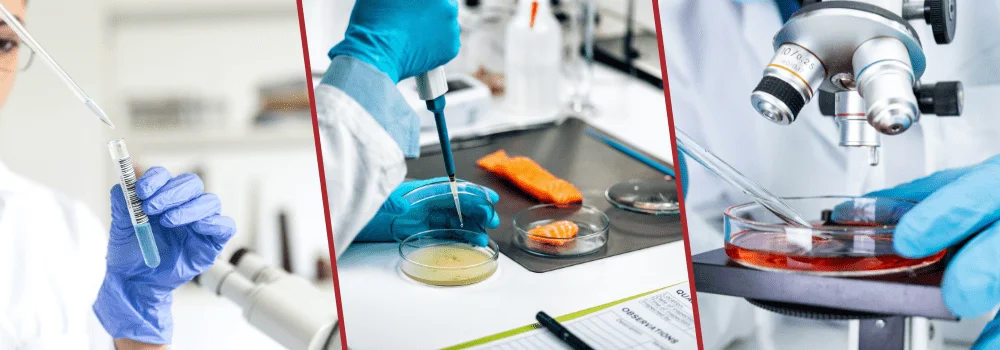How to Become a Microbiologist?
Explore the steps to become a microbiologist after 12th grade, including necessary education, skills, and career prospects in this engaging guide

In this Career Outline

Introduction to Microbiologist
“The work of a microbiologist is to turn curiosity into knowledge and knowledge into solutions.”
A microbiologist studies microbes like bacteria, algae, and fungi, focusing on their growth, structure, and properties. They use specialized tools for forensic investigation, surveillance, and clinical testing, and develop new pharmaceuticals, vaccines, and chemicals. Microbiologists work in academia, healthcare, and government, and need strong intellectual and mathematical skills.
Steps to Become a Microbiologist:
Step-1
Focus on subjects like Biology, Chemistry, and Physics.
Step-2
Enroll in a Bachelor’s program in Microbiology or a related field.
Step-3
Look for internships or lab assistant roles to gain practical experience.
Step-4
Pursue a Master’s degree in Microbiology or a specialized field.
Step-5
Some institutions may require entrance exams for postgraduate programs.
Step-6
Engage in continuous learning and stay updated with the latest research and developments in microbiology.
Step-7
Look for job openings in research labs, healthcare institutions, or pharmaceutical companies.
Eligibility Criteria
| Eligibility Criteria | Description |
|---|---|
| Eligibility | Must possess at least 50% aggregate marks in 12th grade from a recognized board (PUC/CBSE/ICSE/ISC, etc.). |
| Educational Background | High school diploma or equivalent. |
| Undergraduate Degree | A Bachelor of Science (B.Sc) or a diploma in Microbiology, Biology, Biochemistry, Biotechnology, or a related field from a recognized institution. |
| Postgraduate Degree | An M.Sc in Microbiology is beneficial for advanced learning and higher degree roles. |
| Entrance Exams | Valid scores in exams such as JEE-Main, KIITEE, SRMJEE, CEE, HITSEE, CET, etc., may be required based on the college’s admission criteria. |
- Obtain at least 50% aggregate in 12th grade from any recognized board (PUC, CBSE, ICSE, ISC, etc.), though cut-off marks may vary by college.
- Achieve a valid score in Entrance exams after 12th like JEE-Main, KIITEE, SRMJEE, or CET. Colleges may have their own entrance tests or accept other competitive exam scores.
- Acquire a B.Sc or diploma in Microbiology from a recognized institution to qualify for this field.
- An M.Sc in Microbiology can enhance your qualifications for advanced opportunities.

Not eligible to pursue this career?
Find out different career options based on your current academic accomplishments. Enquire with our career experts and build a roadmap to your career success!
Tasks to perform as a Microbiologist:
Knowledge & Skills Required
Microbiologists must possess a wide array of skills to succeed in their careers. Here are the key knowledge areas and skills needed to excel in this field:
| Knowledge Required | |
|---|---|
| Understanding of microbial life processes | Knowledge of genetic makeup of microorganisms |
| Insight into biochemical processes | Basics of immune responses |
| Impact of microorganisms on the environment | Pathogens and disease mechanisms |
| Skills Required | |
|---|---|
| Problem-Solving | Technical Skills |
| Analytical Skills | Communication |
| Teamwork | Attention to Detail |
Understanding What are soft skills? and why is it important,as they complement technical abilities and enhance overall performance in the field of Microbiologist.

The Knowlegde and Skills don't intrigue you?
Your career may not align with your interests. Identify them and match with careers requiring those skills for faster growth and success!
Job roles offered for a Microbiologist:
Once qualified as a Microbiologist, you have numerous career paths:
Studies bacterial samples to understand their biology and help with diagnoses. Advanced degrees in bacteriology or related fields are required.
Investigates compounds and their effects, contributing to various industries by developing and enhancing chemical products.
Works in labs to diagnose and treat diseases, providing expertise in testing procedures and analysis to healthcare teams.
Studies heredity and genetic variation, working on genetic screening and modifications, often involving advanced research techniques.
Analyzes market data to provide financial insights, working across various sectors like finance and investment, and requires strong analytical skills.

Not sure where you fit in?
With countless career options, choosing the right path can be tough. Analysis and guidance sessions help clarify what to study, pursue, and achieve.
Career Opportunities for a Microbiologist:
Microbiologists can opt for various fields of work in the companies listed below:
| Cipla | Dr. Reddy’s | Biocon |
| Sun Pharmaceutical Industries, Inc. | Aurobindo Pharma | Johnson & Johnson |
| Procter & Gamble | VMware | Manipal Hospitals |
| Apollo Hospitals |
Colleges offering courses for Microbiologist:
Here is the list of colleges offering the Best courses after 12th:
| AIIMS Delhi - All India Institute of Medical Sciences, New Delhi | JIPMER Puducherry - Jawaharlal Institute of Postgraduate Medical Education and Research |
| KGMU Lucknow - King George's Medical University | Shree Guru Gobind Singh Tricentenary University, Gurgaon |
| Manipal University (MAHE) - Manipal Academy of Higher Education | Annamalai University, Annamalai Nagar |
| UPUMS Saifai - Uttar Pradesh University of Medical Sciences | Gandhigram Rural Institute, Dindigul |
| KIMS Karad - Krishna Institute of Medical Sciences | CSJMU Kanpur - Chhatrapati Shahu ji Maharaj University |
End Note
Starting a career as a microbiologist opens doors to numerous exciting opportunities. From studying the smallest organisms to making impactful discoveries, it’s a field full of potential. Connect with our experts at SetMyCareer to guide you through Career counselling after graduation and your career journey and help you achieve your goals!
In this Career Outline
You don't fit in as a Microbiologist?
Find out your best suitable career by booking an appointment with our experts
Book nowGet In Touch
No. 14/595, 1st Floor, Nanjappa Reddy Layout, Koramangala 8th Block, Bangalore 560095





